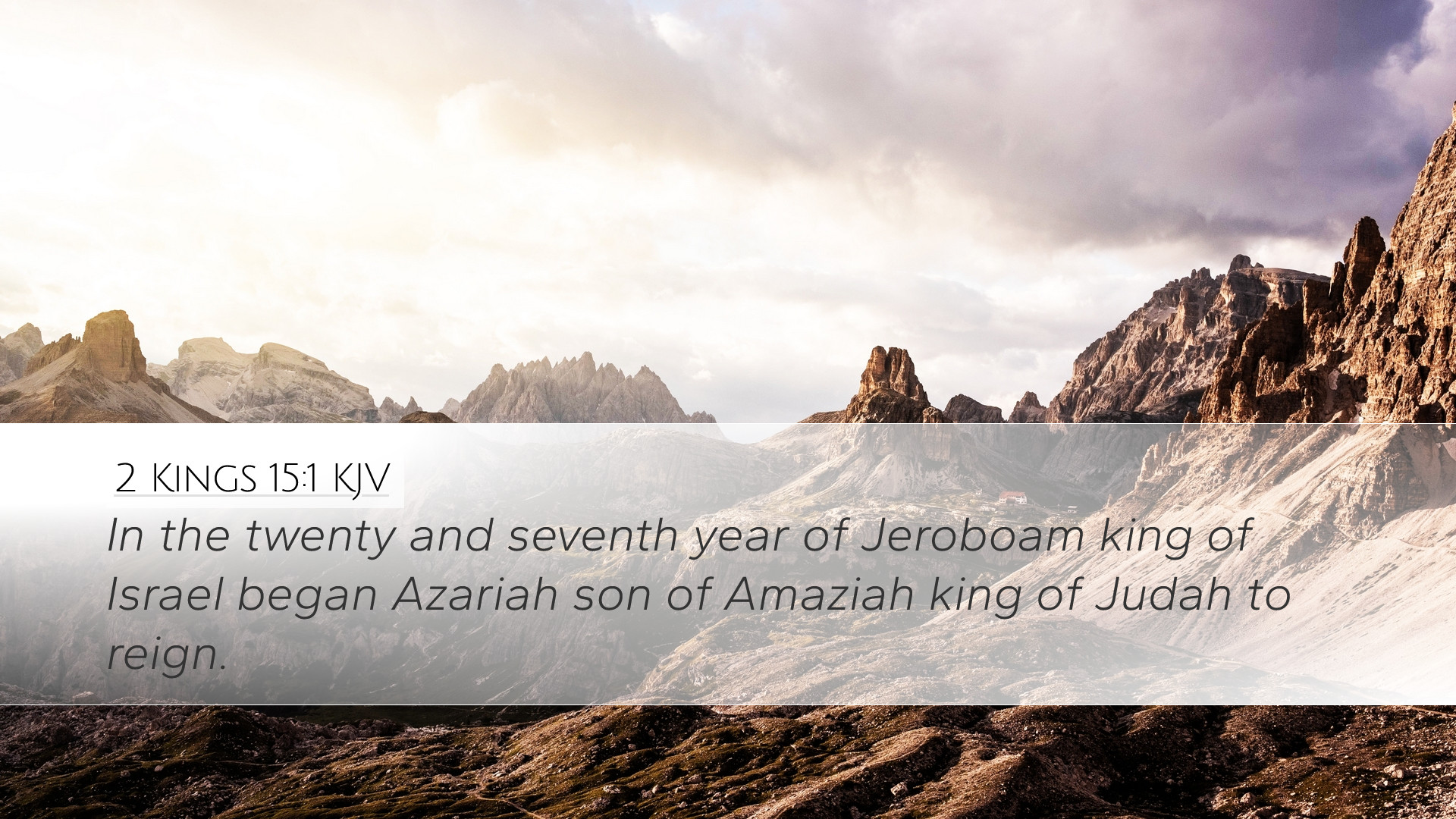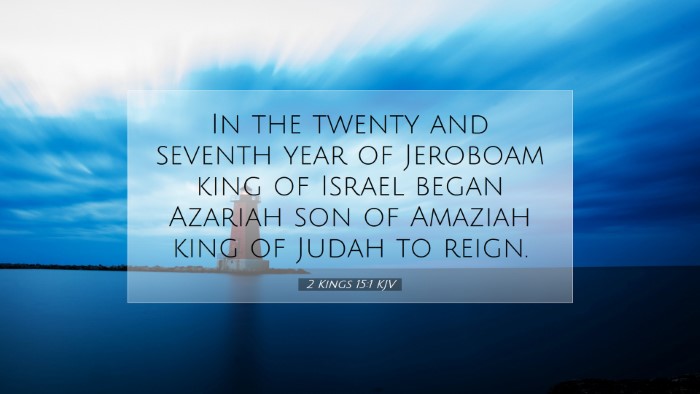Commentary on 2 Kings 15:1
Bible Verse: 2 Kings 15:1
“In the twenty-seventh year of Jeroboam king of Israel began Azariah son of Amaziah king of Judah to reign.”
Introduction
The reign of Azariah (also known as Uzziah) as recorded in 2 Kings 15:1 marks a significant period in the history of Judah. This verse serves as a gateway to understanding the political and spiritual climate of Israel and Judah during this tumultuous time. Through the insights of esteemed theologians like Matthew Henry, Albert Barnes, and Adam Clarke, we delve deep into this verse, revealing its implications for biblical scholars, pastors, and students alike.
Historical Context
The context surrounding 2 Kings 15 is rooted in a fractured Israel where two kingdoms exist: the Northern Kingdom of Israel and the Southern Kingdom of Judah. The verse introduces us to Azariah during the 27th year of Jeroboam II’s reign over Israel.
- Political Landscape: Jeroboam II reigned for approximately 41 years, during which Israel experienced a period of relative prosperity. However, this prosperity was shadowed by moral decay and idolatry. Azariah’s ascension to the throne of Judah would need to address these challenges.
- Relational Dynamics: The relationship between the two kingdoms was often marked by tension and rivalry. Understanding these dynamics is essential to grasping the significance of Azariah's reign.
Character of Azariah
Azariah's character is crucial in evaluating his impact on Judah. As noted by Albert Barnes, his given name ‘Uzziah’ signifies “strength of the Lord” and highlights a theologically rich identity. This renaming reflects a dual nature of divine strength in leadership.
Matthew Henry points out that Azariah, much like his father Amaziah, began his reign in a precarious position, which necessitated a reliance on divine guidance. His character is painted with a mix of personal integrity despite the prevailing corruption in the kingdom:
- Spiritual Leadership: He is recognized as a king who sought to do right in the eyes of the Lord, unlike many of his contemporaries.
- Challenges Faced: Azariah contended with the repercussions of his predecessors’ idolatry and political instability.
Theological Insights
2 Kings 15:1 provides profound theological insights into the nature of God's sovereignty and human agency. Adam Clarke emphasizes the divine orchestration behind the rise and fall of leaders:
- Divine Sovereignty: God's providential control over historical events is evident as He allows leaders to arise in specific times to fulfill His purposes.
- Human Responsibility: While leaders are chosen by God, they bear the weight of their decisions. Azariah’s faithfulness would reflect his understanding of this balance.
Leadership and Legacy
Azariah's reign would ultimately shape the future of Judah. As noted in various commentaries, his ability to navigate the tumultuous waters of politics while attempting to adhere to God's statutes would leave a lasting legacy.
Matthew Henry suggests that a leader’s legacy in God’s kingdom is not merely about political achievements but rather spiritual fidelity:
- Restoration of Worship: His reign is marked by attempts to restore true worship, a theme that resonates throughout the history of Israel’s kings.
- Impact on Generations: Leaders have the responsibility to set a precedent and the moral fabric for future generations.
Application for Modern Readers
The insights gleaned from 2 Kings 15:1 are timeless and hold practical implications for modern readers:
- Importance of Leadership Integrity: Azariah’s example reminds current leaders of the necessity of aligning their decisions with spiritual integrity.
- Understanding Historical Context: Readers are encouraged to approach scripture with a keen awareness of the historical content, thus enriching their biblical understanding.
- The Role of Divine Sovereignty: Believers today can find comfort in knowing that God remains sovereign over the affairs of men, guiding the course of history.
Conclusion
In summary, 2 Kings 15:1 serves as a pivotal text that introduces us to Azariah—an emblem of leadership amid chaos. Combining insights from Matthew Henry, Albert Barnes, and Adam Clarke, we revel in a deeper understanding of the challenges faced by Azariah, the spiritual significance of his reign, and the overarching theme of divine sovereignty. As we reflect on this verse, we are called to embrace the lessons of integrity, faithfulness, and the importance of leadership in furthering God's kingdom.


